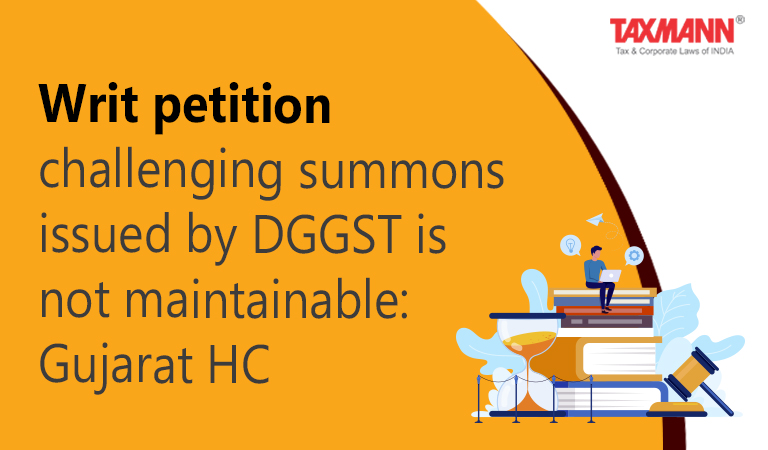Writ petition challenging summons issued by DGGST is not maintainable: Gujarat HC
- Blog|News|GST & Customs|
- 2 Min Read
- By Taxmann
- |
- Last Updated on 29 September, 2021

Case Details: Himanshu Balram Gupta v. Union of India - [2021] 130 taxmann.com 371 (Gujarat)
Judiciary and Counsel Details
-
- J.B. Pardiwala and Ilesh J. Vora, JJ.
- Chetan K. Pandya for the Petitioner. Devang Vyas for the Respondent.
Facts of the Case
The assessee was registered under the provisions of the GST Act at Delhi and was under the jurisdictional control of the Competent Authority, Delhi South. The jurisdictional Competent Authority, Delhi South issued on the assessee summons under section 70 and also granted the permission to search the business premises of the assessee on the basis of his reasonable belief. In the meanwhile, the Directorate General of GST (DGGST), Ahmedabad also issued summons under section 70 with respect to very same investigation. It filed writ petition challenging the summons issued by the DGGST and submitted that there was no good and justifiable reason for the DGGST to undertake a parallel inquiry with respect to same subject matter and issue summons under section 70.
High Court Held
The Honorable High Court observed that the assessee raised grievance with respect to one subject matter that two authorities are conducting the inquiry. Therefore, the only question for consideration was whether High Court should interfere at the stage of issue of summons under section 70. The High Court relied on the decision of Supreme Court in the case of Union of India v. Rajnish Kumar Tuli [Special Leave Criminal Appeal No. 30 of 2011] wherein it was held that a writ petition challenging a summon is not maintainable. Thus, it was held that this writ-application would fail and hence rejected.
Case Review
-
- Shafi Khan Khokhar v. State of Maharashtra [2019] 102 taxmann.com 191 (Bom.) (para 22)
- Commissioner of Customs v. Sayed Ali [2011] 10 taxmann.com 416 (SC) (para 22) distinguished.
List of Cases Referred To
-
- National Building Construction Co. Ltd. v. Union of India [2018] 100 taxmann.com 307 (Delhi) (para 17)
- Commissionerate of Customs Calcutta v. M.M.Exports 2007 (212) ELT 165 (SC) (para 19)
- Union of India v. Rajnish Kumar Tuli [Special Leave Criminal Appeal No. 30 of 2010] (para 20)
- Dukhishiyam Benupani, Asstt. Director, Enforcement Directorate (FERA) v. Arun Kumar Bajoria [1998] 1 SCC 52 (para 20)
- Shafi Khan Khokhar v. State of Maharashtra [2019] 102 taxmann.com 191 (Bom.) (para 22)
- Commissioner of Customs v. Sayed Ali [2011] 10 taxmann.com 416 (SC) (para 2.2).
Disclaimer: The content/information published on the website is only for general information of the user and shall not be construed as legal advice. While the Taxmann has exercised reasonable efforts to ensure the veracity of information/content published, Taxmann shall be under no liability in any manner whatsoever for incorrect information, if any.

Taxmann Publications has a dedicated in-house Research & Editorial Team. This team consists of a team of Chartered Accountants, Company Secretaries, and Lawyers. This team works under the guidance and supervision of editor-in-chief Mr Rakesh Bhargava.
The Research and Editorial Team is responsible for developing reliable and accurate content for the readers. The team follows the six-sigma approach to achieve the benchmark of zero error in its publications and research platforms. The team ensures that the following publication guidelines are thoroughly followed while developing the content:
- The statutory material is obtained only from the authorized and reliable sources
- All the latest developments in the judicial and legislative fields are covered
- Prepare the analytical write-ups on current, controversial, and important issues to help the readers to understand the concept and its implications
- Every content published by Taxmann is complete, accurate and lucid
- All evidence-based statements are supported with proper reference to Section, Circular No., Notification No. or citations
- The golden rules of grammar, style and consistency are thoroughly followed
- Font and size that’s easy to read and remain consistent across all imprint and digital publications are applied



 CA | CS | CMA
CA | CS | CMA
